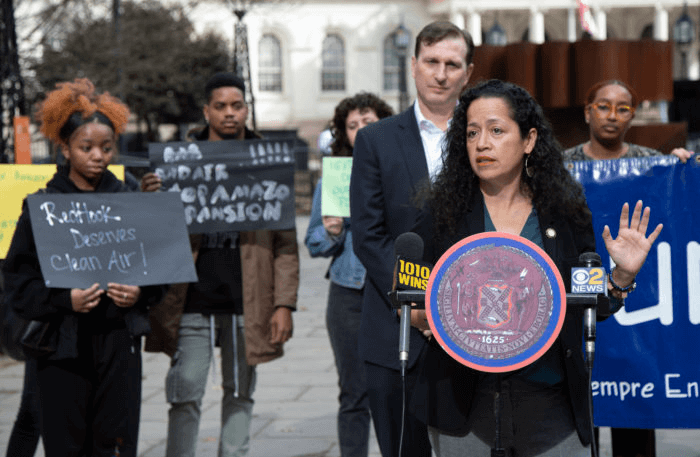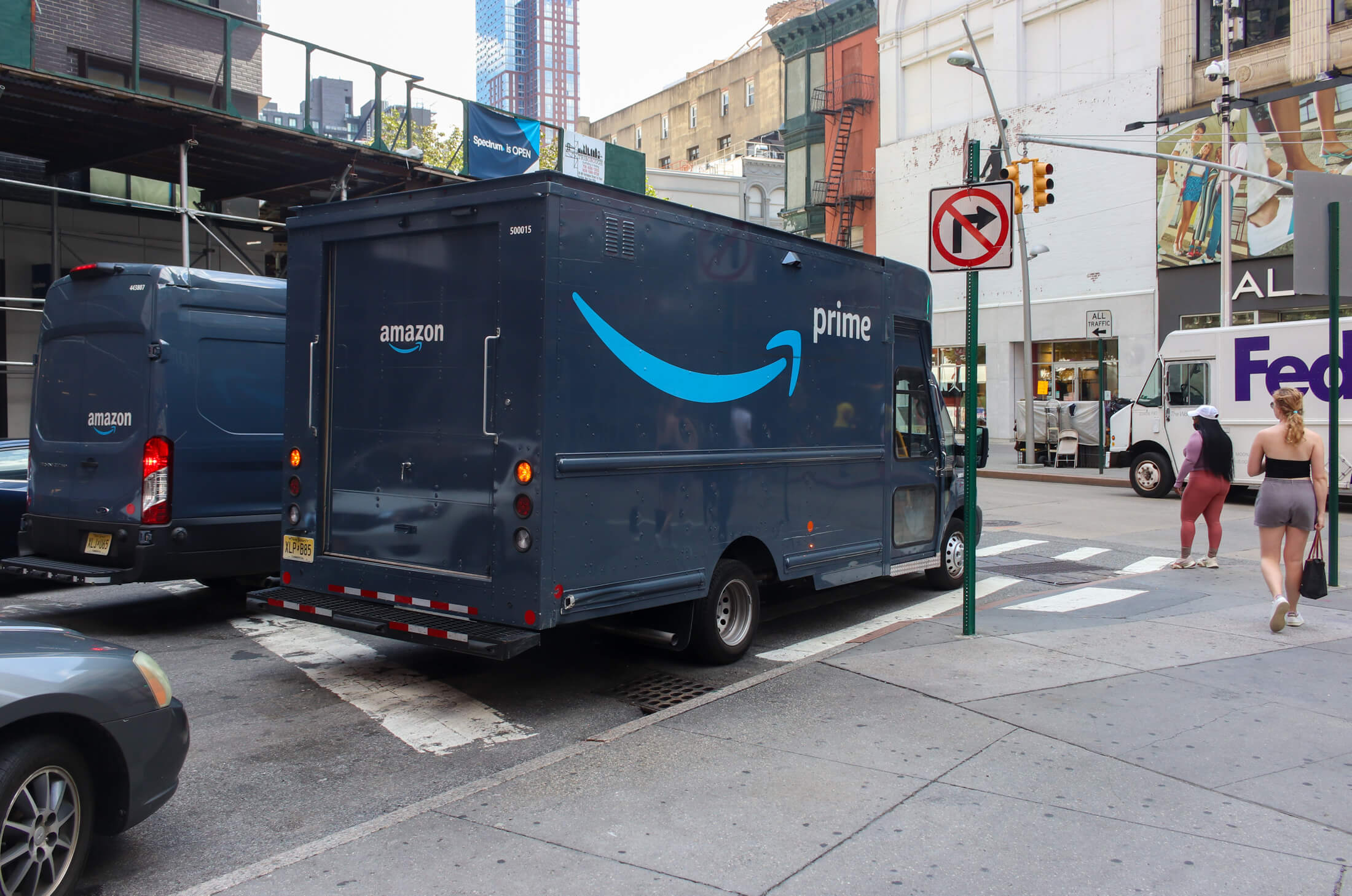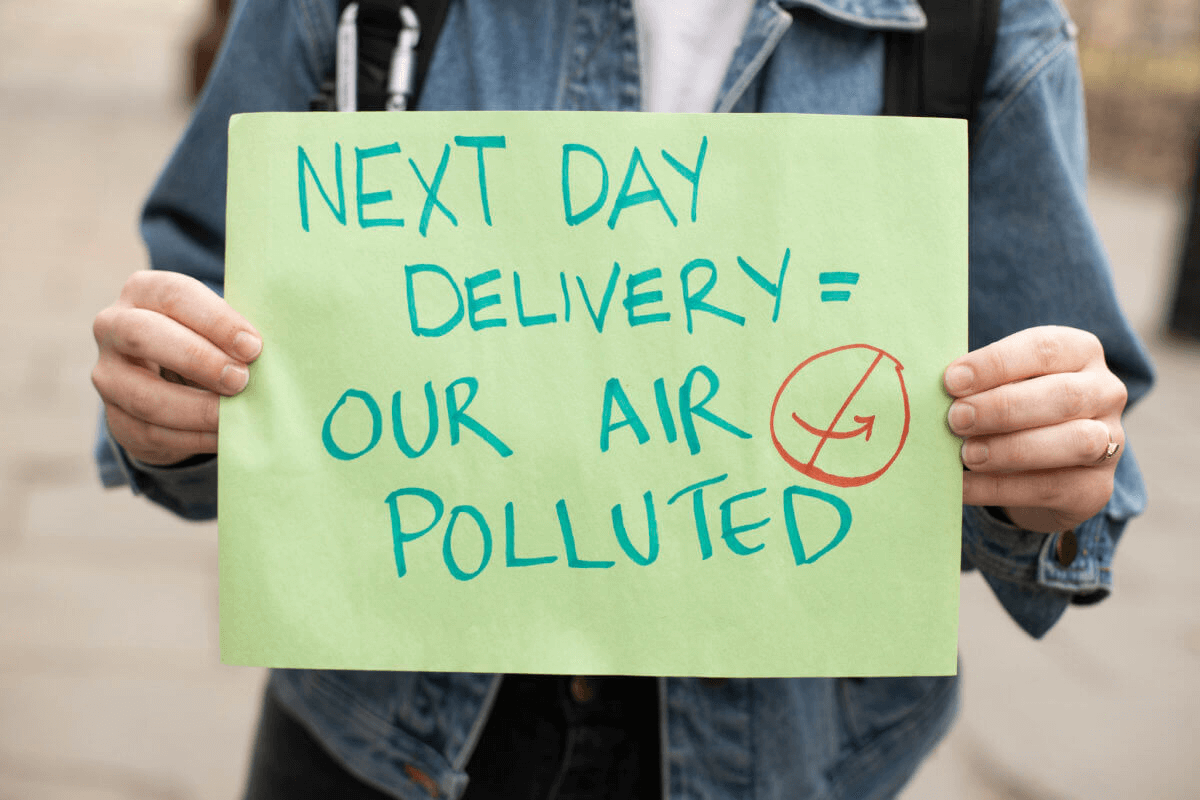Elected officials on the New York City Council are seeking to blunt the proliferation of last-mile logistics warehouses run by Amazon and other large companies, arguing that the rapid package deliveries they facilitate have caused an epidemic of truck traffic, and with it air and noise pollution , in communities of color.
Such facilities have rapidly popped up in Brooklyn since the pandemic, as the demand for extremely rapid delivery of goods has grown. Amazon opened its first fulfillment center on Staten Island in 2018, but as of 2022 the e-commerce giant had placed more than 20 last-mile hubs in New York, according to researchers at the Center for Resilient Cities & Landscapes. And Amazon is far from the only company utilizing such facilities.
The explosive growth has not been distributed evenly across the city, pols argued, with warehouses opening left and right in neighborhoods already zoned for industrial uses, where they can site as of right without any zoning changes. Those are largely composed of waterfront neighborhoods like Sunset Park, Gowanus, and Red Hook in Brooklyn, Maspeth in Queens, and Hunts Point in the Bronx.
But compared to the warehouses of yore, last-mile facilities see massively increased levels of truck traffic, critics say, which by extension leads to greater concentrations of air and noise pollution. Of particular concern is the sitting in areas with disproportionately low-income and non-white populations that have historically borne the burdens of polluting industries.

City Council Member Alexa Avilés speaks at a press conference outside City Hall on February 16, 2023. Photo by John McCarten/NYC Council Media Unit
“Our communities have been dealing with polluting infrastructure for years,” said Council Member Alexa Avilés, a Democrat whose Brooklyn waterfront district includes some of the city’s highest concentrations of last-mile warehouses, at a press conference on Thursday. “This is environmental racism. And last-mile facilities follow the same pattern, of dumping environmental burdens on low-income communities of color. But we are here to say, that’s enough. In 2023, we cannot and will not continue to let these age-old patterns of discrimination and destruction be unfettered within our communities.”
And so on Thursday, City Council members and advocates threw their political weight behind proposed amendments to the city’s zoning code aimed at regulating where companies like Amazon can site their last-mile facilities. The amendments would require companies to seek a “special permit” to site last-mile warehouses in industrial zones where they can presently build facilities as of right. The permit would only be issued if the proposal met three conditions:
- The facility is not within 1,000 feet of a school, park, nursing home, or public housing development.
- The facility is not within 1,000 feet of another last-mile facility.
- If in a “significant maritime industrial area” on the city’s waterfronts, the facility must conduct at least 80 percent of deliveries by boat.
The zoning text amendments are paired with bills requiring the city study the impacts of heavy truck traffic on local communities and infrastructure, ways to redesign streets to limit commercial truck traffic in residential areas, and the feasibility of tracking truck routes with GPS. Other existing bills included in the package would require air quality monitoring on “designated heavy-use thoroughfares” and translate the existing air quality complaint portal into multiple languages.
“If you are a company that’s doing business in our neighborhoods, you have to do it responsibly,” said Council Member Jennifer Gutiérrez, who reps parts of Williamsburg, Bushwick, and Ridgewood. “Take notice that we are trying to reach our climate justice goals, you are being responsible, you are causing not just truck traffic and noise traffic, you are leaving long-term effects in our communities. And these bills are calling that these companies…be responsible, take our communities into account so that we can breathe cleaner air.”

Amazon has opened more than 20 new last-mile facilities in NYC in the past five years. Photo by Susan De Vries
The warehouses have proliferated since the pandemic as demand for fast package delivery, including same-day fulfillment, soared. Amazon’s profits and stock price jumped during the pandemic as lockdown led to increased demand for home delivery.
Amazon’s stock has declined since its 2021-22 highs along with much of the tech sphere, but Americans’ insatiable appetite for same-day delivery remains sky high. By the end of 2021, New Yorkers were receiving about 2.3 million packages per day, up from 1.8 million pre-pandemic, Crain’s reported, citing the Rensselaer Polytechnic Institute’s Center of Excellence for Sustainable Urban Freight Systems.
A spokesperson for Amazon did not respond by press time to amNewYork Metro’s inquiries regarding the company’s existing and planned facilities, as well as its position on the legislative package and whether the company is doing anything to mitigate negative effects from its facilities.
Members of the Last Mile Coalition, which submitted the zoning text amendment proposal to the City Planning Department and is pushing for its adoption, say they are not seeking to squash the machinery of the city’s supply chain. Instead, they say last-mile developers should have to go through a public review process — like many developers seeking rezonings. They also wanted to prevent warehouse clustering in certain neighborhoods and to promote alternative means of delivery besides large, polluting trucks.

Photo by John McCarten/NYC Council Media Unit
“The Adams administration and the Department of City Planning must protect our communities and regulate these facilities by mandating public review and environmental studies to prevent clustering in frontline communities,” said Kevin Garcia, transportation planner at the New York City Environmental Justice Alliance, whose group is part of the coalition.
Council District 38, which includes Sunset Park, Gowanus, and Red Hook and is represented by Avilés, has rates of air and noise pollution above the citywide average, according to Transportation Alternatives’ Spatial Equity tool. Seventy-seven percent of District 38’s population is either Latino or Asian, according to census data.
So far, DCP has declined to consider the amendments, the advocates say. In his “Get Stuff Built” plan, Major Eric Adams lent his support to legislation requiring the creation of “transportation management plans” for any proposed development, including as of right, that would “generate significant truck and vehicle traffic.” Such plans would require companies to prioritize marine and rail transportation as well as non-fossil fuel motor vehicles.
The mayor’s office referred a request for comment to the City Planning Department. Agency spokesperson Joe Marvilli said that the Adams administration is sympathetic to the coalition’s plight and goals, but is concerned about the economic impacts on the distribution of goods and how the city’s notoriously lengthy public review process could affect the creation of new small businesses. He also noted other efforts the city is undertaking in the interim, including incentivizing companies to electrify their truck fleet or piloting the expanded use of cargo bikes.
“Too often, communities of color are forced to bear the burden of poor air quality and public health consequences simply because of where they live,” said Marvilli. “Our administration is committed to replacing a 20th century truck-based delivery model with a 21st century resilient transportation network that reduces emissions and traffic while protecting and creating good jobs. We are working on creative solutions to deliver a greener, healthier city and look forward to reviewing these proposals.”
Editor’s note: A version of this story originally ran in amNY. Click here to see the original story.
Related Stories
E-mail [email protected] with further comments, questions or tips. Follow Brownstoner on Twitter and Instagram, and like us on Facebook.
